
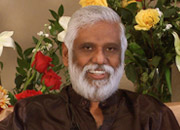
Dr. Pillai believes that one of the greatest acts that a person can do is to change the destiny of a soul with education, or share a meal with someone who is hungry. In 1989, he created Tripura Foundation US as a vehicle to share his science-based, innovative transformational tools and programs with people around the world.
In 1998, Dr. Pillai created Tripura Foundation, India.
In 1999-2000, Mohini and Yadeesh were inspired by Dr. Pillai to launch the preparation and delivery of hot meals to familes in the slums of Chennai, India, like the MGR Colony and the Koilhoppe fishing community. Simple meals brought happiness to so many people! Yadeesh began tutoring the children of Koilhoppe, and we first witnessed the power of education in uplifting the poor. From this simple beginning, feeding the hungry became a key initiative for Tripura, and throughout all these years Tripura has given hot meals served with love to the poor of India. As Tripura directors and staff travel through India, they carry prepared meals with them to give to the roadside destitute, and large feedings have been conducted in many locations, according to the need and occasion.
In 2000, Tripura Foundation partnered with the Rotary Club of Madras in projects to feed children undergoing surgery for polio, as well as sponsoring bright, needy students with scholarships.
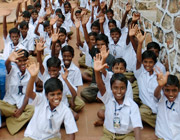
In 2000, Tripura Foundation sponsored 25 boys at the Rotary Club’s Boystown, and discovered further secrets to transformational education for the poor. Yadeesh, the son of a teacher, set forth to educate poor rural boys in traditional ways. After standing before a blackboard for over three weeks to no avail, he discovered that flexible and creative methods were needed to engage boys from simple backgrounds. During one break-through moment, he confided to the boys that he didn’t know how to play and then asked them to be his master and teacher. This simple request allowed them to let down their guards and a two year period of transformational education ensued.
In 2001, Boystown expanded to accommodate 95 boys (50 sponsored from Tripura Foundation) from poor rural villages. Dr. Pillai visited and told the boys that they had to dream big. He shared with the boys that if they wanted to be an engineer, then they had to dream about hugging computers close to their hearts. The boys got busy dreaming with the help of a special relaxation technique, and their self-esteem, confidence and test scores rose significantly.
In 2001, Tripura further partnered with the Rotary Club to provide nutritious snacks to 1000 poor children in Chennai who attended after-school classes to pass their 10th standard exams. The attendance of the children rose to 100% with the gift of the healthy and tasty snack, and the children were much more focused on their studies. Tripura continued this program for several years, again highlighting the power of giving nutrition along with education to nurture body and mind together.
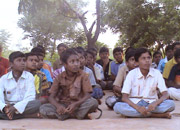 Boystown success continued in 2002. On one fateful day, an injured bird crashed into a classroom and one young boy picked it up and vowed to heal it. True to his word, and with help from his teacher, the young boy indeed nursed the bird back to health and learned about empowerment through compassion. A creative curriculum was inspired by this humble deed and the boys soon enthusiastically launched into learning about how to run their own business breeding and selling pidgeons! The boys also learned to bind notebooks and sell them to classmates, create greeting cards from natural materials, grew their own vegetable garden to feed themselves, and started landscaping the Boystown to reflect beauty everywhere.
Boystown success continued in 2002. On one fateful day, an injured bird crashed into a classroom and one young boy picked it up and vowed to heal it. True to his word, and with help from his teacher, the young boy indeed nursed the bird back to health and learned about empowerment through compassion. A creative curriculum was inspired by this humble deed and the boys soon enthusiastically launched into learning about how to run their own business breeding and selling pidgeons! The boys also learned to bind notebooks and sell them to classmates, create greeting cards from natural materials, grew their own vegetable garden to feed themselves, and started landscaping the Boystown to reflect beauty everywhere.
After four years of success at Boystown, Tripura Foundation could not ignore the fact that area girls were also in need of upliftment. Yet, organizations were reluctant to delve into the care and transformation of girls. Regardless, a deep need was expressed. So, in 2004, Mohini and Yadeesh began planning ways to meet this challenge.
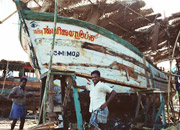 In 2004, the Tsunami hit south India, and there was an urgent need to help devastated families put their lives back together again. Mohini, Yadeesh and Meena explored the worst-affected area of Nagapattinam, and were deeply moved by the signs of tragedy and loss everywhere. After a thorough investigation of the most effective way to help in our special way, Tripura selected 200 families that lost everything in the Tsunami and helped them get back in business by purchasing the business materials needed. Entire families were uplifted with our helping hand and could sustain themselves to rebuild their lives.
In 2004, the Tsunami hit south India, and there was an urgent need to help devastated families put their lives back together again. Mohini, Yadeesh and Meena explored the worst-affected area of Nagapattinam, and were deeply moved by the signs of tragedy and loss everywhere. After a thorough investigation of the most effective way to help in our special way, Tripura selected 200 families that lost everything in the Tsunami and helped them get back in business by purchasing the business materials needed. Entire families were uplifted with our helping hand and could sustain themselves to rebuild their lives.
In 2005, Tripura’s valiant volunteer Manorama was determined to bring the success of Dr. Pillai’s Sound Technology to the poor children of Mexico. The program was officially launched in Dec. of 2005 at the International Conference of New Paradigms of the Science of Education at the University of Baja California in Mexicali, with Manorama as a keynote speaker. Through Manorama’s dedicated efforts and her volunteer team, Tripura’s Enhanced Education was eventually introduced into 30 schools in Mexico. The children experienced the benefits of better focus and concentration in their studies, techniques to handle chaotic family situations, and the teachers were delighted with the transformation in their peaceful classroom behavior. To this day, Dr. Pillai’s Sound Technology is taught to children in Mexico.
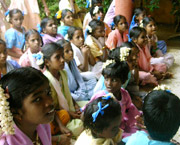 In 2005, Tripura’s Girlstown was set up to accommodate 50 girls from poor rural villages. The children were helped step by step to learn how to groom themselves, enjoy nutritious food to build their strength, and they were introduced to Dr. Pillai’s Enhanced Education to expand their minds and dream of bright futures. The changes were wonderful to witness!
In 2005, Tripura’s Girlstown was set up to accommodate 50 girls from poor rural villages. The children were helped step by step to learn how to groom themselves, enjoy nutritious food to build their strength, and they were introduced to Dr. Pillai’s Enhanced Education to expand their minds and dream of bright futures. The changes were wonderful to witness!
In 2006, Challenges soon hit Tripura’s Girlstown, like a flood and a plague of poisonous snakes, but that didn’t hold back the eager young students from thriving in academics, volunteering at local old-age homes and embracing Dr. Pillai’s Sound Technology!
Two dedicated volunteers, Lalita from Canada and Rani from the US, came to India to care for the girls as their “mothers”. Until the graduation of the girls from Girlstown in 2012, Lalita, also a Tripura program manager, was the constant role model in the girls’ lives and her visits and special activities every week brought the girls Dr. Pillai’s teachings with great love and fun. Lalita witnessed many miraculous transformations in the girls, and celebrated with them every step of the way.
In 2007, Tripura Foundation educators realized that their transformational educational teachings had remarkable results and therefore should be shared via partnerships with 10 other educational organizations in Chennai. Thousands of people, from poor children affected by polio, orphan boys and girls, abandoned children and mentally ill and destitute adults were helped with Dr. Pillai’s Sound Technology, through the help of Tripura volunteers Lalita, Sucharita and Valli.
In 2010, Tripura partnered with a massive community-building movement in the Philippines, known as GK or Gawad Kalinga, to build one entire holistic and sustainable community of 30 homes, value-based education for the children, and good health practices in the worst slum of Manila. GK Tripura Hope Town was completed in June 2010. Tripura sought to introduce this model of building sustainable communities into India, but the challenges of legalities with acquiring land became obvious after one year of hard efforts.
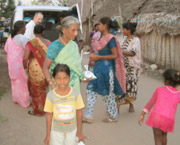
In December of 2010, Tripura began serving the poor of Goa, India. While seeking to build communities there, Mohini and Meena were moved by the plight of the roadside destitute. Migrant people wandering in from surrounding areas live on the streets of Goa, hoping to sustain their lives. These people were very elderly, mentally ill or abandoned. Mohini and Meena started the initiative Hope on Wheels, which began daily delivering hot, tasty meals throughout Goa to the destitute. In the rainy season, blankets and raincoats were delivered to give protection from the elements. Tripura’s staff member Vinod gave the street people extra love and attention- helping them shave and groom themselves, and helped mothers to place their children in school.
In 2011, Mohini and Yadeesh decided that Tripura could best build communities through the “infrastructure” of education and the Science of Sound as the building blocks to build new lives. Plans were made to strategically create after-school Centers that implement Tripura’s proven and highly successful Enhanced Education and Sound Technology in the most remote, rural villages, serving the children of severely disadvantaged families.
On June 13, 2011, Six Hope Centers were launched in south India. Each Center empowered 35 children (and still does) through a holistic educational balance of physical activity, nutritious foods, and strengthening of minds via Tripura’s Sound Technology, now called Phonemic Intelligence.
In September, 2011, two new Hope Centers were opened. Tripura began community outreach at the Centers through educational classes for the mothers and teaching new skills, as well as community service projects for the children to teach them compassion and giving back to others in need.
Tripura’s girls graduated from Girlstown in April 2012. The girls enjoyed a very festive reunion celebration, and many stories were shared of their transformed lives and plans for the future, with most of the girls either entering college or planning to enter college- a first for their families!
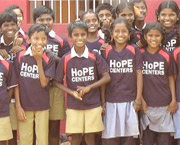
Tripura Foundation plans to open 100 Hope Centerss in more locations throughout India by the end of the year; seeking out the most remote and isolated villages, the most devastated families who have lost the father of the family through suicide, alcoholism or desertion for another woman, single mothers trying to support an entire family through day labor that pays the equivalent of $25 a month, and children longing for a chance to excel at education and have a dramatically different life than the lives of their parents. Hope Centers are already creating a phenomenon in rural India, and many more villages are petitioning for Tripura to create a Hope Center for their poorest children and uplift their families and communities with the same transformational education that creates new destinies!
